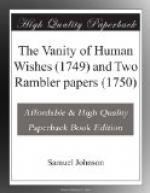It is frequently objected to Relations of particular Lives, that they are not distinguished by any striking or wonderful Vicissitude. The Scholar who passes his Life among his Books, the Merchant who conducted only his own Affairs, the Priest whose Sphere of Action was not extended beyond that of his Duty, are considered as no proper Objects of publick Regard, however they might have excelled in their several Stations, whatever might have been their Learning, Integrity, and Piety. But this Notion arises from false Measures of Excellence and Dignity, and must be eradicated by considering, that, in the Eye of uncorrupted Reason, what is of most Use is of most Value.
It is, indeed, not improper to take honest Advantages of Prejudice, and to gain Attention by a great Name; but the Business of the Biographer is often to pass slightly over those Performances and Incidents, which produce vulgar Greatness, to lead the Thoughts into domestick Privacies, and display the minute Details of daily Life, where exterior Appendages are cast aside, and Men excel each other only by Prudence, and by Virtue. The Life of Thuanus is, with great Propriety, said by its Author to have been written, that it might lay open to Posterity the private and familiar Character of that Man, cujus Ingenium et Candorem ex ipsius Scriptis sunt olim simper miraturi, whose Candour and Genius his Writings will to the End of Time preserve in Admiration.
There are many invisible Circumstances, which whether we read as Enquirers after natural or moral Knowledge, whether we intend to enlarge our Science, or encrease our Virtue, are more important than publick Occurrences. Thus Salust, the great Master, has not forgot, in his Account of Catiline, to remark that his Walk was now quick, and again slow, as an Indication of a Mind revolving something with violent Commotion. Thus the Story of Melancthon affords a striking Lecture on the Value of Time, by informing us that when he made an Appointment, he expected not only the Hour, but the Minute to be fixed, that Life might not run out in the Idleness of Suspense; and all the Plans and Enterprizes of De Wit are now of less Importance to the World, than that Part of his personal Character which represents him as careful of his Health, and negligent of his Life.
But Biography has often been allotted to Writers who seem very little acquainted with the Nature of their Task, or very negligent about the Performance. They rarely afford any other Account than might be collected from publick Papers, and imagine themselves writing a Life when they exhibit a chronological Series of Actions or Preferments; and so little regard the Manners or Behaviour of their Heroes, that more Knowledge may be gained of a Man’s real Character, by a short Conversation with one of his Servants, than from a formal and studied Narrative, begun with his Pedigree, and ended with his Funeral.




